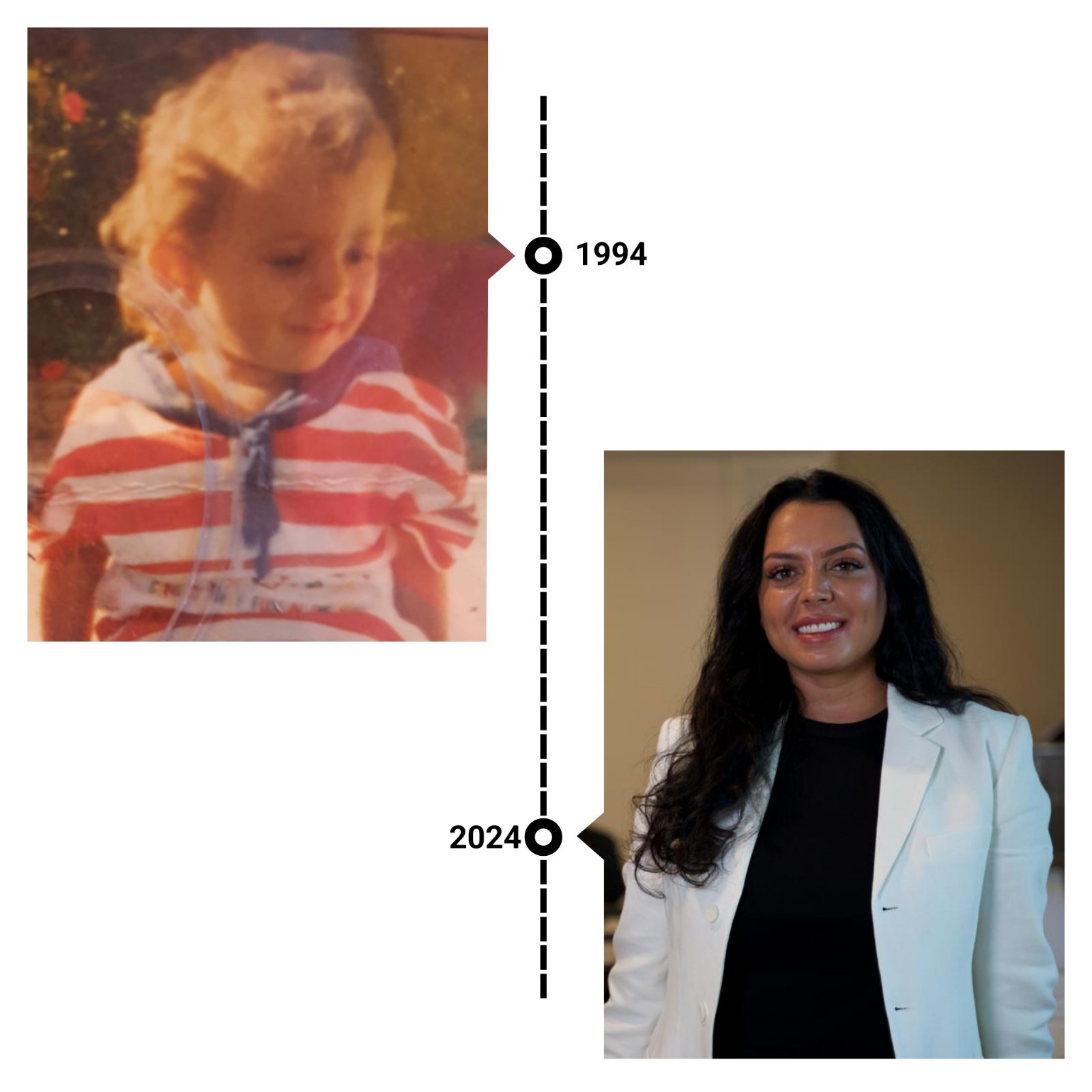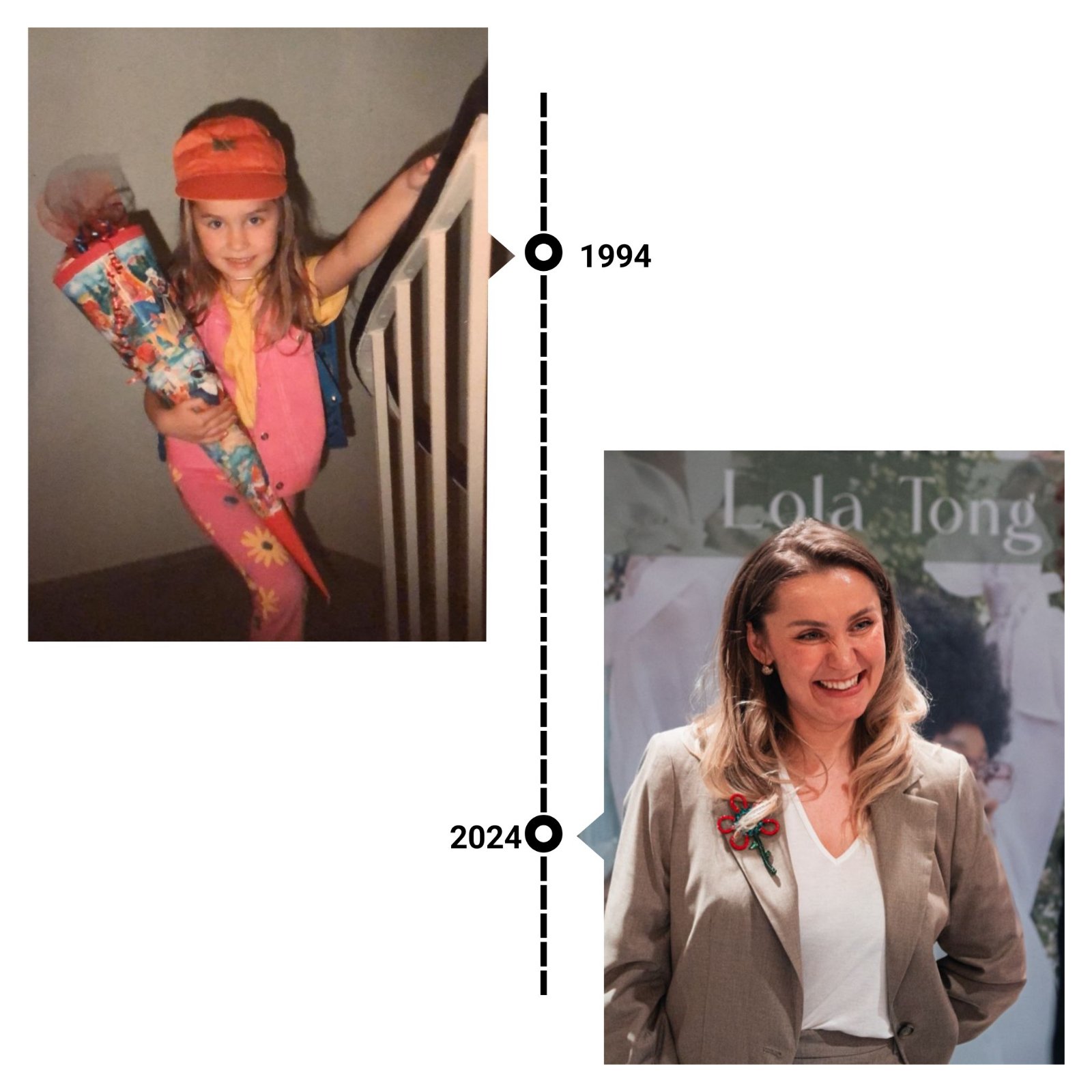The Kosovo Albanian community, once displaced by political turmoil and war, has recently been surging Switzerland’s business landscape at an incredible pace.
The halls and offices of Google in Zurich, Switzerland, were buzzing with a harmonious blend of chit-chat and banter in Albanian and Swiss German as everyone enjoyed the AI-inspired beer ‘Mu’Pi’ on the evening of May 31. The event, titled “AI und Die Zukunft der Arbeit (AI and the Future of Work),” was organised by Google and swissalbs, a business network that connects Albanian Swiss entrepreneurs in Switzerland.
The event, initiated and moderated by 42 year old Kosovo Albanian entrepreneur, Kristian Kabashi, brought together many successful Kosovo Albanian entrepreneurs, each representing the community’s presence in Switzerland’s business landscape.
“Your job will be taken by someone who is using AI, not AI,” the casually dressed Kabashi said. .
In 2020, Kabashi founded his company Numrics, which uses AI to provide digital and centralised management for accounting, finances, payroll, and administration. Currently, Numarics has 180 employees, 40 of whom are based in Prishtina.
He is only one of approximately 300,000 Albanian speakers who currently live and work in Switzerland, many of whom arrived in Switzerland as refugees after being forced to flee the Kosovo war or the pre-war unrest.
Ambitious individuals of the Kosovo Albanian community in Switzerland have transformed adversity into opportunity, bringing fresh perspectives to sectors such as AI, finance, healthcare, and fashion, as well as reshaping the immigrant narrative and establishing stronger connections between Kosovo and Switzerland.
The outset of this journey unfolded under incredibly different circumstances back in the 1990s.
Kosovo Albanians were devoid of any basic language communication skills in any of the three official languages: German, French, or Italian. All they had to show for was the luggage they carried with nothing more than naïve hope and a deep-rooted will to work. They seized any job offered to them, driven by the imperative to feed and educate their kids and support their kin back home.
Fast forward around 30 years later, the second generation of Kosovo Albanian immigrants have embraced the blend of different cultures, which further strengthens and broadens their success story narrative.
Kabashi’s connection with AI expands beyond personal interest and into a vision for all Albanians: “Imagine Albanians dominating the global landscape as entrepreneurial masterminds, and Kosovo becomes the place where whiz kids casually manage robotic assistance,” he told BIRN. His ambitious vision reaches further where he envisions his community “marking their place in the world as smart entrepreneurs.”
His bold outlook captures the essence of the ambitions and idealistic heart of an unrestrained future built on the hard work of these entrepreneurs’ parents.

“AI und Die Zukunft der Arbeit (AI and the Future of Work),” organised by Google and swissalbs in Zurich, Switzerland, May 31. Photo: Courtesy of Alberta Statovci
From Refugees to Entrepreneurs: Challenges and Triumphs
Islam Makica, a first-generation immigrant, dropped his studies in Economics at the University of Prishtina because of financial and political turmoil in Kosovo and made his way to Switzerland in 1990. There, he toiled long hours on a farm, determined to secure a bright and prosperous future for his kids, including his strong and very successful daughter, Liridona Makica, who is now an entrepreneur.
Liridona, now 31 years old, was born and raised in Switzerland. She found herself caught between two culturally diverse worlds and the choice between a family life and a career, both wrapped around a wealth of responsibilities.
Liridona’s caring nature brought her closer to medicine and compelled her to take matters into her own hands. In 2021, she established her own company, SpitexDona, which focuses on medical support at home, including nursing and rehabilitation. Her company utilises cutting-edge technology to improve the efficiency and effectiveness of services and emphasises individualised care plans tailored to each client’s unique needs.
“Given my father’s long hours at work, and considering my mother was not fully integrated, along with our big family of six siblings, I started taking more and more responsibilities as time went by. From managing things at home, I eventually started looking after them, too,” she told BIRN.
Zahrije Makica, Liridona’s mother, was a stay at home mother, tending to her and Islam’s six children. It was difficult for Zahrije and Islam to leave Kosovo and their families behind, especially because they did not have mobile phones and long-distance calls were very expensive. “They were also unable to fly to Kosovo often in order to reduce the costs and thus support the family in Kosovo more,” their daughter told BIRN.
Many Kosovo Albanians with advanced degrees in fields such as banking, law, and others were relegated to seeking employment as custodians, construction workers, and maintenance staff for Swiss with similar professional and educational backgrounds. Their daily existence was marked by a profound sense of insecurity and instability as they spent each evening anxiously absorbing the news and praying for the safety of their loved ones back home in war-torn Kosovo.
After enduring numerous hardships throughout their history, Kosovo Albanians found their silver lining in their agility and an uncanny ability to work hard and approach challenges with an innovative mindset. Leveraging on these traits that set them apart has transformed the story and given us a bright future to look forward to.
According to the local Swiss media SWI, approximately 300,000 Albanian speakers currently live and work in Switzerland. They frequently overcomenumerous challenges to achieve success in a country with a robust economy, intense competition, and a nation crowned the world’s top talent hub by the World Economic Forum.
Arbela Statovci, a board member of swissalbs and its media and communication representative, told BIRN that 650 companies owned by Kosovo Albanians in the German-speaking part of Switzerland have become members of swissalbs in the recent years.
“Each is distinguished by its unique and innovative approach, including industries such as AI, health, marketing, and sustainable fashion,” she said.
Sevdail Tahiri, director of Albinfo, media that reports on Kosovo Albanians in Switzerland, estimates that around 6,000 companies operating in Switzerland are owned by the Albanian community, but there is currently no official data confirming this.

Liridona Makica as a child (L) and now (R), 30 years later. Photo: Courtesy of Liridona Makica
Overcoming culture barriers and bringing back to Kosovo
Many Kosovo Albanian entrepreneurs, who were either born and raised in Switzerland or went there as children refugees with their parents, see language now not as a barrier but as a means of connecting and harmonising the two cultures.
Mentor Latifi, Kosovo’s Ambassador to Switzerland, told BIRN in a LinkedIn correspondence that “the primary purpose of our Kosovo embassy is to encourage young entrepreneurs and Albanian-owned companies to also invest in Kosovo. Therefore, we continuously lobby them —even though they already always have their attention on Kosovo— and in case they are interested, we strive to ease all possible bureaucratic procedures for them and to organise network meetings with key business decision-makers.”
Kabashi also has a vision for the entrepreneurial advancement of his community in Switzerland and Kosovo. Kabashi went beyond social confines, rejecting the conventional expectations imposed by his parents and the Albanian diaspora, which often emphasised the gratitude for secure 9-to-5 employment. He started taking risks, and climbed slowly to executive positions in Zurich, Switzerland, London, the United Kingdom, and even New York, the US.
Harnessing the power of speaking both the local and the business language and fueled with a strong belief in the power of AI, Kabashi coined the term ‘Blank Collar’ in 2015, which he explained in his book “The Blank Collar Equation: A manifesto for the future of work,” advocating for a business world free of the traditional blue and white-collar definitions.
Describing himself as “a generalist in the world of specialists, traversing from one country to another,” Kabashi believes that the future will not benefit from specialists anymore. Instead, “the workforce of the future will be defined by its adaptability, innovation, and ability to leverage technology to create meaningful and sustainable growth…which can make it uniquely positioned to navigate the complexities of the modern work environment.”
In Kabashi’s eyes, Kosovo has a great potential to cultivate a generation of ‘Blank-Collar’ businesses.
Despite his fight against social norms, Kabashi’s risk-taking and generous nature comes extensively from his family’s background. His parents left Kosovo in the early 90s due to financial difficulties and in search of a better future. As soon as they got settled, they made it their duty to help Kosovo, and later on their family members, recover financially from the war.
Much like them, Kabashi gives back to the community by preparing the younger generations for the business world and helping them understand its dynamics. He modestly says he does it not out of duty but out of intrinsic motivation. As an afterthought, he called it the ‘micro and the macro effect.’
“I am trying to establish a brand for Kosovo. Not only should we create companies abroad and locate them back here, but we should also establish them in Kosovo and have them compete with the rest of the world. I am trying to be an ambassador for what Albanians can be if they leverage the power of AI,” he told BIRN.

Kristian Kabashi moderating the “AI und Die Zukunft der Arbeit (AI and the Future of Work)” event in Zurich, Switzerland, May 31. Photo: Courtesy of Kristian Kabashi
Women’s ‘Harsher’ Journey Towards Integration and Sustainability
From AI to the care industry, the challenges of integration took a much more distinct shape for immigrant women.
As successful as she is now, Liridona Makica’s professional journey began with minimal support.
She initially lost the backing of her partner, who strongly opposed her decision to dedicate her time to pursuing higher education and investing in her career over family life at such an early stage. Perceived as an outsider to close-knit communities at work, she also faced criticism there.
When she started working in a small Swiss village, the CEO and COO supported her success, but she did not receive the same respect from her colleagues.
“At one point, upon my promotion to nursing management, I was straightforwardly told, ‘an Albanian woman and a young one in management, that can’t be good’,” she recalled.
“As a result [of her promotion], two other employees quit immediately afterward,” she explained to BIRN.
Despite having started at a personal loss, today she is surrounded by a strong community and around 56 Swiss and Albanian employees in her own company. Her resilience fueled her to reshape her destiny and create a balanced and inclusive environment, while promoting the merge of her two cultural backgrounds.
“Food is a wonderful way to connect cultures. I like to prepare traditional Albanian dishes and share them with my Swiss friends,” she said, adding that “I integrate the values of both cultures into my daily life. From the strong sense of community and hospitality in the Albanian culture to the efficiency and punctuality in the Swiss culture”.
While continuing to invest in Switzerland, the land of her upbringing, Makica is also working toward opening a nursing home in Kosovo, and beginning to invest in the homeland she has romanticised since birth.
Kosovo Albanian women entrepreneurs in Switzerland learnt the harsh way that acceptance and integration require mutual embrace to foster not only harmony but also sustainability in the world.
Vlora Rexhepi, 36, grew up in Germany, where her family had gone to escape the war in Kosovo. Growing up, trying to fit in, she and her family tried celebrating her birthday the same way her German friends did. As an adult, she emphasises not limiting herself to one culture or circle of people.

Vlora Rexhepi in the first day of school in Germany (L) and at her company’s latest event (R). Photos: Courtesy of Vlora Rexhepi/ (R) Gion Wurster
“I’m open-minded and enjoy multiculturalism because it reflects who I am—a person with diverse cultural backgrounds, speaking several languages, and someone who enjoys sharing my values, whether they come from my Albanian heritage or Germany,” she said.
Rexhepi’s professional background in Congress Management in Germany led her to relocate to Zug, Switzerland, where she pursued a master’s degree in Business Administration with a major in Tourism.
After completing her studies, she worked as a Business Manager for luxury jewellery Swiss brand, Gubelin. Embracing Zug as her “third home,” she became increasingly concerned about sustainability and the future of the world. Moved by her passion, she quit her job and co-founded Lola Tong, a clothing brand that combines conscious fashion with luxury.
“There is a tendency to show off by buying luxury products and demonstrating that ‘we’ve ‘made it’,” she told BIRN, attributing her generation’s excessive consumption to being the first to afford indulgent shopping.
“Growing up in Germany, I always had to pronounce my first and last name in a German way, as it was quite normal for a kid with a foreign background. I was surprised when I came to Switzerland and found that Swiss people knew how to pronounce my name. This was a very positive experience for me,” she said.
Today, the support she receives now from both communities is inspiring. The Albanian expatriates endorse her company, while the community of Zug proudly champions her as a “Zuger startup.” One day, she dreams about opening her own production line in Kosovo.
Frequent visits to Kosovo, where women work tirelessly as tailors and seamstresses for minimal pay, have pushed Rexhepi and her partner, Dennis Tong, to challenge the idea of doing more for less.
They are committed to ensuring proper recognition for the designers and artisans, including her mother, Fahrije Rexhepi, who immigrated to Germany in 1992. She is a nurse who divides her time between the hospital and Lola Tong.
“When I heard about Lola Tong for the first time and the possibility of becoming part of this project, I felt like my heart skipped a beat—my fashion sketches are becoming real,” Fahrije said, proud of her daughter and excited to finally be able to live a childhood dream through her.
Please enable JavaScript to view the comments powered by Disqus.


